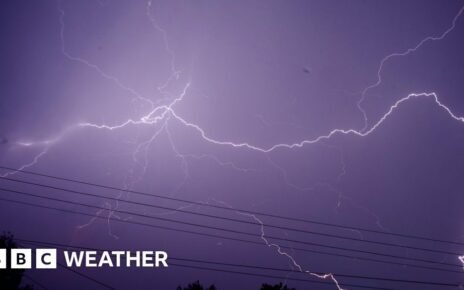[ad_1]
A rape survivor who received multiple letters from her jailed attacker has criticised a prison for failing “to keep victims safe”.
HMP Parc in Bridgend, south Wales, is already under pressure after 10 prisoners died in three months earlier this year.
Rieve Nesbitt-Marr, 21, waived her right to anonymity to tell the BBC she was sent seven letters from her rapist in 10 months, despite pleading with authorities to take action.
HMP Parc said it takes public protection “extremely seriously” and that it had tried to stop the letters.
Warning: This report contains detail some people may find distressing
 Rieve Nesbitt-Marr
Rieve Nesbitt-MarrMs Nesbitt-Marr had been seeing John Harding, 28, for just 12 days when he imprisoned her in her flat and raped her in July 2023.
At one point during the prolonged attack, in which he also stood on her head and dragged her along the floor, he told her she was “not scared enough”.
Ms Nesbitt-Marr escaped her flat in Newport the following morning and ran to a local Boots store where she told staff she had been raped.
Police arrested Harding the same day and he was taken to HMP Parc to await his trial.
Around three weeks later, Ms Nesbitt-Marr received the first letter from Harding, sent via a fellow inmate.
In the letter, seen by the BBC, Harding said he missed the feel of her “naked skin” and said he wanted to be in a relationship with her when he “gets out”.
Ms Nesbitt-Marr, who was diagnosed with post-traumatic stress disorder (PTSD) after Harding’s violent attack, said it felt like he was handing her the letter himself.
 Rieve Nesbitt-Marr
Rieve Nesbitt-Marr“My mind just froze and I saw all of the events happening again,” she said.
“It really did put me back in that moment.”
She called Gwent Police, who gave her a crime reference number and suggested she contact the prison.
The prison told her to use a scheme, launched by the UK government in 2022, in which victims can ask for unwanted contact from prisoners to be stopped.
Ms Nesbitt-Marr did this, but the letters continued.
In total, she said she received seven letters, both before and after Harding’s trial and conviction last year.
Harding was found guilty in December of six counts including false imprisonment and rape against Ms Nesbitt-Marr.
In the same trial, he was also found guilty of four counts against a 16-year-old victim, including false imprisonment, strangulation and threats to kill.
He was jailed for 15 years and given a restraining order banning him from contacting Ms Nesbitt-Marr directly or through third parties, but the letters continued.
Eventually, she shared her story on TikTok.
The videos had hundreds of thousands of views and women messaged her to say they had experienced similar problems.
But months on, Ms Nesbitt-Marr said the privately-run prison had still not reached out to her or apologised, leaving her “completely in the dark”.
Ms Nesbitt-Marr’s dad, Paul, worked in prisons for 20 years.
He said preventing letters reaching victims was a “basic” part of a prison’s duty to keep members of the public safe.
After Harding sent a second letter to his daughter, he said he called the prison to explain the situation.
He said: “I explained that my understanding was that the security manager should be briefing the staff who deal with post and telling them that no correspondence with the victim’s name and address should be leaving the establishment, under any circumstances.”
He said he was assured that would happen, but it did not.
“It makes me feel extremely angry,” he added.
“When I was working in prisons, this would be one of the most basic duties.”
G4S, which runs HMP Parc, said it had taken “all appropriate steps” but acknowledged it had not been able to stop the letters.
It said it had taken action, including disciplining Harding and two other inmates, and reporting the letters to police.
But it said Harding “chose to breach his restraining order by using third parties”.
The spokesperson added: “We appreciate that these letters would have caused immense distress and express our sympathies to Ms Nesbitt-Marr.”
Gwent Police said it was investigating the letters.
Violence against women and girls campaigner Ellie Wilson, who waived her right to anonymity as a rape survivor to campaign for more support, praised Ms Nesbitt-Marr for speaking out and said survivors were treated as an “afterthought” by the justice system.

Ms Wilson’s attacker, Daniel MacFarlane, was found guilty of two rape charges and sentenced to five years in prison in July 2022, after she gave police an audio recording of him confessing to raping her.
She has since successfully campaigned for a pilot scheme in Scotland to give victims free access to court transcripts.
Speaking about Ms Nesbitt-Marr’s experience, she said: “It’s awful to hear what she’s gone through, both at the hands of her perpetrator, but also at the hands of the system.
“We need to make sure that the justice system properly supports survivors, and ensures that justice is actually delivered.”
Sara Kirkpatrick of Welsh Women’s Aid said Ms Nesbitt-Marr’s experience was not isolated.
She said: “We do receive calls from people receiving contact that they did not want from an offender who is currently in prison.
“My clear advice would be, do not throw it in the bin and share that information with the police, with the prison authorities, with your support worker, because it is a further offence.”
 Rieve Nesbitt-Marr
Rieve Nesbitt-MarrMs Nesbitt-Marr said she chose to waive her anonymity in the hope that telling her story would protect other victims.
“I feel like you need to be able to see me, and to see how much pain I’m going through, to help me change things,” she said.
“A prison’s role is to keep victims safe and so far they haven’t done that.
“I would like an apology from the prison because I have still not received one and I would like to stop being contacted by the person who sexually assaulted me.”
Ms Nesbitt-Marr said she also wanted to show other victims that they were not alone.
“I want women to know that this is nothing to be embarrassed about,” she said.
“The only person that needs to be embarrassed is the person who violated you.”
If you, or someone you know has been affected by issues raised in this story, sources of support are available via the BBC Action Line.
[ad_2]
Source link freeslots dinogame telegram营销




